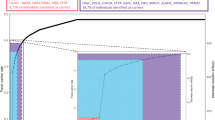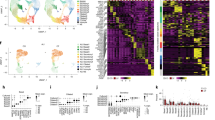Abstract
Attitudes towards cystic fibrosis (CF) carrier testing, benefits of and barriers to having such a test were assessed within a randomly selected group of high school students in Flanders, after they had received sufficient basic information about the nature and the mode of inheritance of CF. Attitudes towards carrier testing for CF were not negative, but the majority preferred to wait to have a test. This result changed little after 6 months. A hypothetical testing offer from the Medical School Health Service elicited positive answers from nearly two thirds, suggesting that such an offer may function as a cue to action. Nevertheless, the appropriateness of such an offer may be questioned, considering the disadvantages of testing adolescents. Concern about a negative impact of the carrier status on self-image was reported by 10% of the students. These findings suggest that education about genetics is not only a prerequisite for allowing more informed decisions about CF carrier testing, but also for avoiding negative psychosocial effects of such a test.
Similar content being viewed by others
Log in or create a free account to read this content
Gain free access to this article, as well as selected content from this journal and more on nature.com
or
References
Boat TF, Welsh MJ, Beaudet AL: Cystic fibrosis; in Scriver CR, Beaudet AL, Sly WS, Valle D (eds): The Metabolic Basis of Inherited Disease. New York, McGraw-Hill, 1989, pp 2649–2680.
Tsui LC, Buchwald M, Barker D, Braman JC, Knowlton R, Schumm JW, Eiberg H, Mohr J, Kennedy D, Plasvic N, Zsiga M, Markiewicz D, Akots G, Brown V, Helms C, Gravius T, Parker C, Rediker K, Donis-Keller H: Cystic fibrosis defined by a genetically linked polymorphic DNA marker. Science 1985;230:1054–1057
Kerem BS, Rommens JM, Buchanan JA, Markiewicz D, Cox TK, Chakravarti A, Buchwald M, Tsui LC: Identification of the cystic fibrosis gene: Genetic analysis. Science 1989;245:1073–1080
Wilfond BS, Fost N: The cystic fibrosis gene: Medical and social implications for heterozygote detection. JAMA 1990;263:2777–2783
Beaudet AL: Carrier screening for cystic fibrosis. Am J Hum Genet 1990;47:603–605
American Society of Human Genetics: Statement of the American Society of Human Genetics on cystic fibrosis carrier screening. Am J Hum Genet 1992;51:1443–1444
Chase GA, Faden RR, Holtzman NA, Chwalow AJ, Leonard CO, Lopes C, Quaid K: Assessment of risk by pregnant women: Implications for genetic counseling and education. Soc Biol 1986;33:57–64
Huys J, Evers-Kiebooms G, d’Ydewalle G: Framing biases in genetic risk perception; in Caverni JP, Fabre JM, Gonzalez M (eds): Cognitive Biases. Amsterdam, North Holland Elsevier, 1990, pp 59–68.
Modell B: Cystic fibrosis screening and community genetics. J Med Genet 1990:27:475–479.
Scriver CR, Fujiwara TM: Cystic fibrosis genotypes and views on screening are both heterogeneous and population related. Am J Hum Genet 1992;51:943–950
Witt DR, Blumberg B, Schaefer C, Fitzgerald P, Fishbach A, Holtzman J, Kornfeld S, Lee R, Nemzer L, Palmer R, Sato M, Jenkins L: Cystic fibrosis carrier screening in a prenatal population. Am J Hum Genet 1992;51(suppl):A16.
Kaplan F, Clow C, Scriver CR: Cystic fibrosis carrier screening by DNA analysis: A pilot study of attitudes among participants. Am J Hum Genet 1991;49:240–242
Mitchell J, Scriver CR, Clow CL, Kaplan F: What young people think and do when the option for cystic fibrosis carrier testing is available. J Med Genet 1993;30:538–542
Ten Kate LP, Tijmstra TJ: Community attitudes to cystic fibrosis carrier screening. Prenat Diagn 1990;10:275–276
Williamson R, Allison MED, Bentley TJ, Lim SMC, Watson E, Chappie J, Adam S, Boulton M: Community attitudes to cystic fibrosis carrier testing in England: A pilot study. Prenat Diagn 1989;9:727–734
Cobb E, Holloway S, Elton R, Raeburn JA: What do young people think about screening for cystic fibrosis? J Med Genet 1991;28:322–324.
Watson EK, Mayall E, Chappie J, Dalziel M, Harrington K, Williamson R: Screening for carriers of cystic fibrosis through primary health care services. BMJ 1991;303:504–507
Mennie ME, Gilfillan A, Compton M, Curtis L, Liston WA, Pullen I, Whyte DA, Brock DJH: Prenatal screening for cystic fibrosis. Lancet 1992;340:214–216
Watson EK, Williamson R, Chappie J: Attitudes to carrier screening for cystic fibrosis: A survey of health care professionals, relatives of sufferers and other members of the public. Br J Gen Pract 1991;41:237–240
Decruyenaere M, Evers-Kiebooms G, Denayer L, Van den Berghe H: Cystic fibrosis: Community knowledge and attitudes towards carrier screening and prenatal diagnosis. Clin Genet 1992;41:189–196
Siegel S, Castellan NJ: Nonparametric statistics for the behavioral sciences. New York, McGraw-Hill. 1988.
Rosenstock IM: Patterns of health behavior; in Hsia YE, Hirschhorn K, Silverberg RL, Godmillow L (eds): Counseling in Genetics. New York, Liss, 1979, pp 139–154.
Kaplan F, Mitchell J, Ravone G, Fernandes L, Clow C, Scriver CR: Cystic fibrosis carrier detection by DNA test: A population study. Carrier frequencies and attitudes toward a test with imperfect sensitivity. Am J Hum Genet 1992;51(suppl):A268.
Haan EA: Screening for carriers of genetic disease: Points to consider. Med J Aust 1993;158:419–421
Williamson R: Universal community carrier screening for cystic fibrosis? Nat Genet 1993;3:195–201
Marteau TM, Van Duijn M, Ellis I: Effects of genetic screening on perceptions of health: A pilot study. J Med Genet 1992;29:24–26
Evers-Kiebooms G, Denayer L, Welkenhuysen M, Cassiman JJ, Van den Berghe H: A stigmatizing effect of the carrier status for cystic fibrosis? Clin Genet 1994;46:336–343
Watson EK, Mayall E, Lamb J, Williamson R: Psychological and social consequences of community carrier screening programme for cystic fibrosis. Lancet 1992;340:217–220
Acknowledgements
We are very grateful to all the students, teachers and directors of the schools involved in the study. Gratitude is extended to the medical and social staff of the Medical School Health Service of the University of Leuven. This project was financed by a grant from the Flemish Action Programme on Biotechnology (1992–1994).
Author information
Authors and Affiliations
Appendices
A: Existing Knowledge about CF
Have you heard of CF before?
-
(1)
Yes
-
(2)
No
Do you know a child with CF in your surroundings?
-
(1)
Yes
-
(2)
No
Give a brief description of the disease.
____________________________
____________________________
____________________________
-
(1)
CF is caused by environmental factors.
-
(2)
CF is caused partly by hereditary factors and partly by environmental factors.
-
(3)
CF is caused by a chromosomal abnormality.
-
(4)
CF is caused by a gene abnormality.
-
(5)
I do not know.
[Option 4 is the correct answer.]
-
(1)
CF occurs almost exclusively in boys.
-
(2)
CF occurs almost exclusively in girls.
-
(3)
CF is (approximately) equally likely to occur in boys as in girls.
-
(4)
I do not know.
[Option 3 is the correct answer.]
B: Information about Cystic Fibrosis
Cystic fibrosis (CF) is a serious disease occurring in childhood. It is caused by the malfunctioning of certain glands, resulting in the mucus (e.g. mucus in the lungs and in the intestines) being sticky and viscous. Serious problems concerning the lungs, the bronchial tubes and the digestive system can already exist at birth. The sticky mucus clogs the minor bronchial tubes, creating difficulties in breathing. Pneumonia also occurs frequently. The presence of the sticky mucus in the intestines leads to digestive disorders. The physical development and maturation of CF children are often retarded.
CF is an incurable disease. A specially adapted diet and good medical treatment can to some extent reduce and/or postpone the physical symptoms. Despite the progress in treatment already made, many CF patients still die before they reach adulthood.
CF is a hereditary disease. Approximately 1 person out of 25 is an asymptomatic carrier of CF, in other words, carries a defective hereditary characteristic, which can cause CF. A carrier does not have symptoms of the disease him/herself but the defective characteristic for CF is present in his/her genetic material. It is possible that he/she passes on the defective characteristic to his/her children.
A couple can have a CF child only if both the father and the mother are asymptomatic carriers of the defective gene.
When two asymptomatic carriers of CF have a child, then the chance is 1 out of 4 (25%) that this child will suffer from CF; 2 out of 4 (50%) that this child will be a carrier of the disease, but does not suffer from it (like the parents); and 1 out of 4 (25%) that this child does not suffer from the disease and is not a carrier, in other words, this child cannot transmit the disease.
Before a pregnancy, the examination of mouthwash samples makes it possible to detect asymptomatic carriers of CF (persons who do not suffer from the disease, but who may pass it on to their children); this procedure is called a carrier test.
Prenatal diagnosis makes it possible to detect the disease during pregnancy.
C: Knowledge about Recessive Inheritance and Carriership for CF
-
(1)
An asymptomatic carrier of CF is suffering from CF.
-
(2)
An asymptomatic carrier of CF will get CF later in his/her life.
-
(3)
Other people can be infected by an asymptomatic carrier of CF and get CF also.
-
(4)
An asymptomatic carrier of CF will pass the gene with certainty to each of his/her children and they will all be carriers.
-
(5)
There is a chance that an asymptomatic carrier of CF will pass the defective gene to his/her children, so there is a chance that they will be carriers too.
-
(6)
There is a chance that the children of an asymptomatic carrier of CF will suffer from CF.
For each of these six statements the subjects could choose to answer ‘correct’, ‘wrong’ or ‘I do not know’.
D: Attitudes toward Carrier Screening for CF and Perceived Benefits of and Barriers to Knowledge of Their Own Carrier Status
Your situation being as it is NOW, would you want to know NOW if you are an asymptomatic carrier of CF?
-
(1)
Yes
-
(2)
I do not know
-
(3)
No
What would encourage you to have a carrier test for CF NOW? In other words, according to you, what are the advantages of receiving a carrier test NOW?
______________________________
______________________________
______________________________
What would hold you back from having a carrier test for CF NOW? In other words, according to you, what are the disadvantages of receiving a carrier test NOW?
______________________________
______________________________
______________________________
Would you want to know your carrier status IN THE FUTURE?
-
(1)
Yes
-
(2)
I do not know
-
(3)
No
At what time in the future?
______________________________
What would encourage you to have a carrier test for CF IN THE FUTURE? In other words, according to you, what are the advantages of receiving a carrier test IN THE FUTURE?
______________________________
______________________________
______________________________
What would hold you back from having a carrier test for CF IN THE FUTURE? In other words, according to you, what are the disadvantages of receiving a carrier test IN THE FUTURE?
______________________________
______________________________
______________________________
Suppose that the School Health Service were to offer all sixth-year students of secondary school the possibility for testing if they are asymptomatic carriers of CF (a test based on a mouthwash sample). What would you do in such a case?
-
(1)
I would let them test if I am a carrier of CF
-
(2)
I do not know
-
(3)
I would not let them test if I am a carrier of CF
Rights and permissions
About this article
Cite this article
Welkenhuysen, M., Evers-Kiebooms, G., Decruyenaere, M. et al. Adolescents’ Attitude towards Carrier Testing for Cystic Fibrosis and Its Relative Stability over Time. Eur J Hum Genet 4, 52–62 (1996). https://doi.org/10.1159/000472170
Received:
Accepted:
Issue date:
DOI: https://doi.org/10.1159/000472170
Key Words
This article is cited by
-
Carrier screening in preconception consultation in primary care
Journal of Community Genetics (2012)
-
Illness Representations, Self‐Regulation, and Genetic Counseling: A Theoretical Review
Journal of Genetic Counseling (2006)



